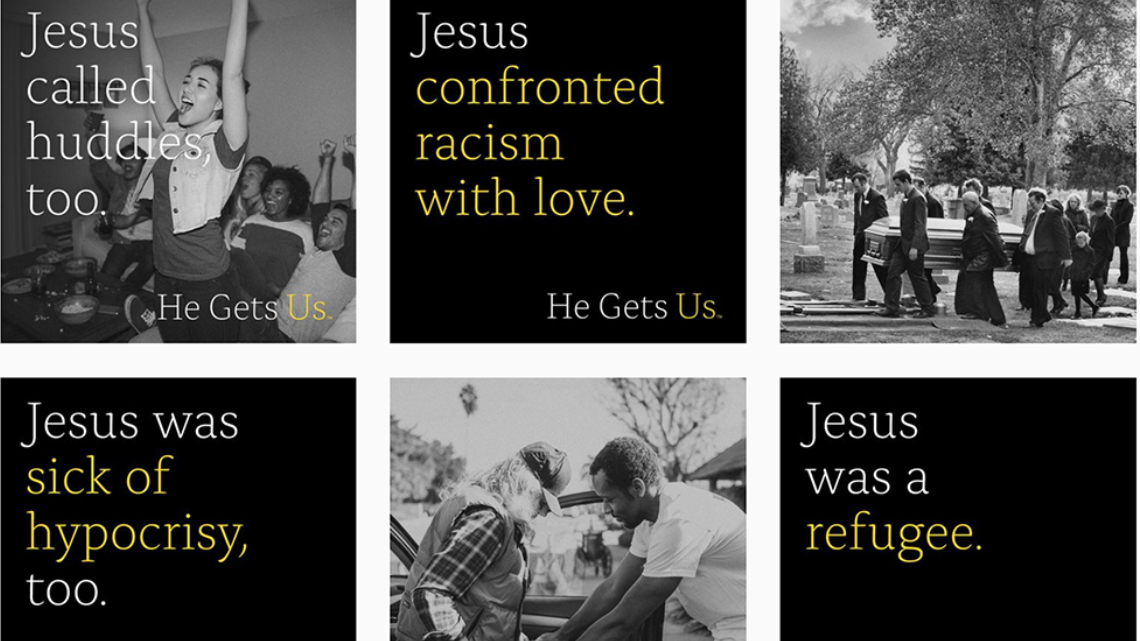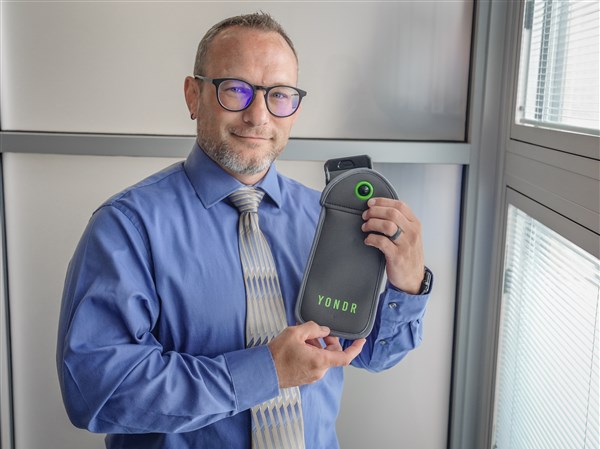Marketing Jesus
In the 33 years of Jesus’ life, his reputation spread by word of mouth. Two thousand years later, the book about his life is still the bestselling book of all time.
Jesus has done well without a public relations firm, commercials, or apps inviting believers to know him. Maybe that’s because his disciples – and most Christians throughout time – lived in a pre-tech world.
Today, would Paul have produced a series of television commercials instead of writing letters-epistles? Would the TV commercials resemble those in the billion-dollar, three-year campaign called “He Gets Us”? Would Jesus have used a prayer app to teach the Lord’s Prayer to disciples? The digital marketplace is flooded with such apps, including the popular Hallow, a Catholic app in which celebrity Mark Wahlberg is a partner and investor.
When it comes to messages of faith, young people are going to seek modes of communication that are familiar to them. — Bishop Tonyia Rawls
The traditional model of “fishing” for Christians, where you learn about Jesus inside a church, may not be the most popular practice that today’s young people follow.
When it comes to messages of faith, young people are going to seek modes of communication that are familiar to them, says Bishop Tonyia Rawls, founder and executive director of the Freedom Center for Social Justice and pastor emeritus of Sacred Souls United Church of Christ, both in Charlotte, North Carolina.
“We are never going back to that (brick-and-mortar) model. Never,” says Rawls.
A 2024 Gallup survey found a continuing decline in the number of U.S. adults who attend religious services. Specifically, more than 35% of people 18- to 29-year-olds said they have no religious preference, according to the survey.
But these new “fishing” methods raise essential questions, such as: Once hooked, what’s next for the consumer of Jesus? And what version of Jesus is being sold?
What version of Jesus is being sold?
“With technology, there are much easier ways – especially with AI – to deceive the public’’ says Rawls. “I would ask: What Jesus are they encouraging people to know? There are multiple Jesuses flowing around out here now.”
The “He Gets Us” campaign debuted during Super Bowl 2023 when the average cost for a 30-second ad was $7 million, and the estimated viewership was 100 million-plus people. He Gets Us LLC ran a 60-second commercial featuring photos of foot washing, including a Latino police officer washing the feet of a young Black man, a White woman washing the feet of a young White girl outside a “Family Clinic,” and a White rancher-type man washing the feet of an elderly Indigenous man.
At the end of the series of photos were the words: “Jesus Didn’t Teach Hate. He Washed Feet. He Gets Us. All of Us.”
Another 30-second ad showed pictures of people from all walks of life, asking at the end: “Who is my neighbor? The one you don’t notice, value, welcome.”
Discerning message and meaning
Christian conservatives were quick to criticize the commercials, some saying the ads implied Jesus was someone cool with sinful behavior rather than someone who hung out with sinners only because he tried to inspire them to change.
According to a Scripps News article published in February 2024, the groups and people associated with the ad campaign have ties to conservative religious and political agendas. The article said the campaign was first spearheaded by The Servant Foundation, doing business as The Signatry, a Kansas-based donor-advised fund. The Signatry’s website says it has “recommended grants to over 13,000 nonprofits, working to bring the hope of the gospel to all.”
According to Scripps News, the Servant Foundation has donated to Alliance Defending Freedom, a conservative legal group that helped overturn Roe v. Wade in 2022. The article also notes that one of Signatry’s donors is “Hobby Lobby CEO David Green, whose company won a Supreme Court case in 2014, claiming a religious exemption to providing contraception coverage under the Affordable Care Act.”
More recently, another charitable organization named Come Near has taken control of the ad campaign. Published media reports say David Green’s son Mark serves on the board of Come Near. The founder of BrandHaven (formerly Haven), the marketing firm that created the “He Gets Us” campaign, has previously run campaigns for two organizations that have worked to oppose LGBTQ rights.
Still, the “He Gets Us” website says in its FAQs that all people, including those who are gay and transgender, are welcome. After a question on its stance on the LBGTQ+ community, included in the answer is: “Jesus loves gay people and Jesus loves trans people.”
What does this mean for the person who goes to the campaign website to begin studies of Jesus?
“I am very big about freedom of speech,” said Rawls. “I’m an activist. I want my voice to be heard. I am also clear it is getting more and more difficult to discern what are legitimately Christian-based principles and what are the rules and desires of men.”
“It is getting more and more difficult to discern what are legitimately Christian-based principles and what are the rules and desires of men.” — Bishop Tonyia Rawls
The “He Gets Us” campaign would be part of what Rev. Carlton Johnson calls “the Christian enterprise, where the whole marketing and sale of Jesus occurs.”
But Johnson says the Jesus offered in the campaign is “counter to everything about Jesus in the biblical text and is just a transactional relationship with Jesus to fix our society, believing we can pray hard enough to fix the ills — homeless, poverty, racism. God is waiting on you to do work and has equipped you to do it,” says Johnson, the interim director for the PC(USA) Office of Racial Equity and Women’s Intercultural Ministries, and a chaplain at two Atlanta hospitals.
In other words, critics point out the commercials ask nothing of seekers.
Critics point out the commercials ask nothing of seekers.
“Jesus interacted with people,” says Pastor Shawn Boonstra, an Adventist minister who is director of ministry, voice of prophecy, and host of the Authentic TV & Radio Show, which is broadcast on some 530 stations worldwide.
“Jesus didn’t just tack up notices around town and sit in hiding. He interacted with people,” says Boonstra. “He loved them. You don’t get the complete picture until you are immersed in relationship, in the community.”
Boonstra says he has “a love-hate relationship with technology,” adding, “I am able to reach audiences I never could reach before. The world opened up (with technology).”
On its website, hegetsus.com, the campaign offers a “new way to explore the story of Jesus’ life and teachings.” However, for further study, the campaign has partnered with Alpha, a free study series that introduces people to basic Christian principles. Founded 40 years ago, Alpha is used by various denominations, often with some tweaking.
For-profit prayer apps, celebrity and genuine faith
Meanwhile, there has been a proliferation of prayer apps that offer another way to enter the world of faith and study Jesus.
Around 2010, mindfulness and meditation apps arrived in the digital marketplace. Critics considered them shallow when it came to religion. About 2016, other religious apps began to appear. Among the earliest was Pray.com, which was launched in 2016 and advertised on its website as the “#1 app for daily prayer and faith-based audio content.” The app features megachurch Bishop T.D. Jakes in “Sleep Psalms” and Dr. Phil, former host of a TV advice show, in “Prayer Therapy.”
Apps partner with celebrities as one way of attracting users. Hallow, a Catholic prayer and meditation app with over a million users, is associated with actor Mark Wahlberg. The app raised over $52 million in investments. Wahlberg provides exclusive content for the app and appeared in a Super Bowl commercial promoting Hallow’s annual #Pray40 challenge. Actor Jonathan Roumie, who played Jesus in the TV series “The Chosen,” and Wahlberg have led worldwide prayer meditations on the app.
The first page of Hallow.com says: “Join Mark Wahlberg and Jonathan Roumie on Hallow, the #1 prayer app.”
Hallow introduces users to different prayer methods, inspiring talks, guides to spiritual practices, and notifications to encourage a consistent and full prayer life. The app’s free version allows access to some content; the paid subscription ($9.99/month or $69.99/year) includes over 10,000 stories, prayers, meditations, songs, audiobooks, guides, and prayer challenges.
On Apple’s App Store, 247,000 users have rated Hallow 4.9 out of 5.0. and left comments like, “I love that the content regularly changes to reflect the liturgical seasons…” and “I’ve learned so many new prayers that I never knew before…”
Nevertheless, apps raise questions and challenges similar to those raised by campaigns such as “He Gets Us.” These campaigns and apps are just the beginning. Again, the challenge is: What next?
The role of relationship
Ministers are quick to point out that the real work for faith seekers is in reading and studying for yourself, learning, and doing.
“As a priest, I know that helping people develop healthy prayer habits is important. But both as a scholar of Christian spirituality and as someone who provides spiritual direction to others, I see limitations in what prayer apps can achieve,” wrote Father Dorian Llywelyn, a theologian and now director of Loyola Marymount University’s Center for Ignatian Spirituality.
In an article in the online publication The Conversation, Llywelyn said many unaffiliated people nevertheless “yearn for a sense of religious belonging, and these apps appear to help in creating a faith-based community.”
However, the theologian questions whether or not this is a community in which relationships develop that allow one pray-er to learn and share with another.
“An embodied community asks people to show up regularly in real-time and gather together with those they may not know well or even like,” says Llywelyn. “In the Catholic tradition, prayer is not primarily about finding peace, joy or reducing stress. If any app helps people to be more patient, humble, just, and attentive to the poor, it’s a good thing. But being an active member of a real community is likely needed as well.”
“If any app helps people to be more patient, humble, just, and attentive to the poor, it’s a good thing. But being an active member of a real community is likely needed as well.” — Father Dorian Llywelyn
“Christianity is relational. Jesus interacted with people,” Boonstra said.
Rawls recalls fondly how, as a child, she learned about the Bible from older church members. Later, she was mentored and received teachings from those more experienced in prayer. Yet, she says the generational differences must be considered when we discuss how one enters a religion or receives information today.
“I grew up at a time when the Bible was our thing. What I was accustomed to was Bibles that looked heavily used. Some you can literally see where my hands used to hold them,” says Rawls, 66. “That was where I got my information. I had other people who helped me to interpret and understand these varied ways of looking at the Bible.
“It was wonderful. But there was no internet, no social media, very few modes for learning about the Bible without having my pastors and teachers in the church help me.”
As a young adult, she sought advice from her archbishop, who suggested she get to know “the Jesus of the Bible” and said, “Read what he said versus what other people said about what he said. Read the red letters.”
She sees apps as “a door for the new generation, some of whom may never have flipped the pages of a Bible. The principle is if a young person is hungry for more of God or the things of God, they will do exactly what I did. I just did it without access to the varied things they have access to.”
In other words, once they enter the world of faith, they must begin self-studying, aided by a caring community of seekers. In a good community, Rawls says that people encourage you to find and define God in your way rather than telling you who God is.

“Whatever I am thinking about God, I am clueless on some levels,” she says. “That’s where faith comes in. When people talk about what they know and try to force other people in those boxes, I have cautions. Ain’t nobody that gifted, anointed, or smart.”
Boonstra cites 1 Corinthians 12:12, “For just as the body is one and has many members, and all the members of the body, though many, are one body, so it is with Christ,” to emphasize the importance of including the community experience in the journey of those who seek to know Jesus or God.
“No one person gets the whole thing. You work together, and together, we begin to see a clearer picture of God,” says Boonstra. “God intended for us to be in community.”
More recently, the Rev. Sam McGregor, transitional pastor of First Presbyterian Church in Lancaster, South Carolina, has witnessed God’s community at work in the mountains of Western North Carolina, where people are still recovering from Hurricane Helene’s ravages.
McGregor asks, “How do you express your faith? Is it through spending money for ‘He Gets Us’ or getting supplies and chainsaws and showing up in Western North Carolina? Or can it be both?
“How do you express your faith? Is it through spending money for ‘He Gets Us’ or getting supplies and chainsaws and showing up in Western North Carolina? Or can it be both?” — Rev. Sam McGregor
“I found God in the way people – many of whom are Christians – respond to these communities in need. Rev. Mary Katherine Robinson, pastor of Black Mountain Presbyterian Church and the person I just had a conversation with is now collecting items for seniors displaced by the hurricane. This is faith in action. That is where faith is meaningful.”


